The history of the English language
关于英语的发展史的英文原版书籍
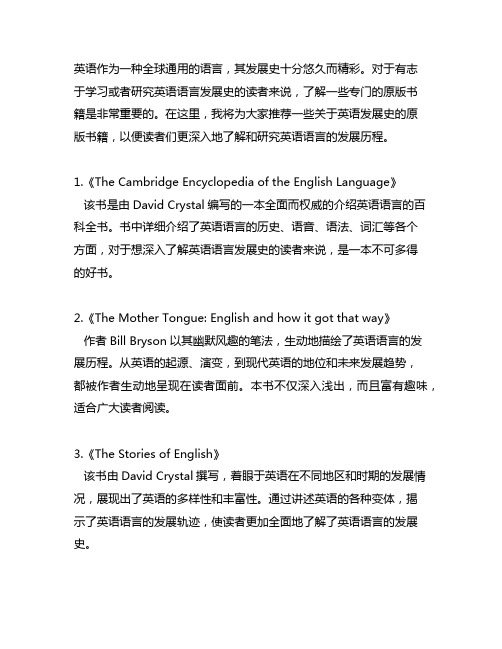
英语作为一种全球通用的语言,其发展史十分悠久而精彩。
对于有志于学习或者研究英语语言发展史的读者来说,了解一些专门的原版书籍是非常重要的。
在这里,我将为大家推荐一些关于英语发展史的原版书籍,以便读者们更深入地了解和研究英语语言的发展历程。
1.《The Cambridge Encyclopedia of the English Language》该书是由David Crystal编写的一本全面而权威的介绍英语语言的百科全书。
书中详细介绍了英语语言的历史、语音、语法、词汇等各个方面,对于想深入了解英语语言发展史的读者来说,是一本不可多得的好书。
2.《The Mother Tongue: English and how it got that way》作者Bill Bryson以其幽默风趣的笔法,生动地描绘了英语语言的发展历程。
从英语的起源、演变,到现代英语的地位和未来发展趋势,都被作者生动地呈现在读者面前。
本书不仅深入浅出,而且富有趣味,适合广大读者阅读。
3.《The Stories of English》该书由David Crystal撰写,着眼于英语在不同地区和时期的发展情况,展现出了英语的多样性和丰富性。
通过讲述英语的各种变体,揭示了英语语言的发展轨迹,使读者更加全面地了解了英语语言的发展史。
4.《The History of English: A Linguistic Introduction》该书由Scott Shay编写,是一本专门介绍英语语言历史的语言学专著。
作者通过分析英语的词汇、语法、语音等方面,构建了一幅完整的英语语言发展史的图景,对于专业研究英语语言的学者和学生来说,是一部必备的参考书。
5.《The English Language: A Historical Introduction》该书由Charles Barber、Joan Beal和Philip Shaw合著,全面系统地介绍了英语语言历史的方方面面。
英语发展史 the history of English PPT课件
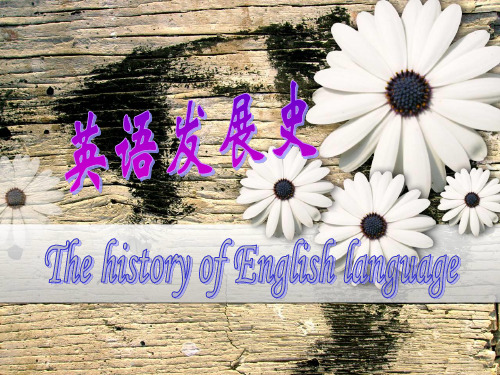
thanks
由此产生的许多短语一直保留到现在,如
night and main, friend or foe, a labour of love。
(公元1100—1500年)
In 1066, the Normans conquered
1066 14
England. French became the
存并很语 象语
了。在复合词的构成格式方面,也吸收 了法语的一些特色,例如:名词+形容词, 副词+过去分词(例by-gone)。这些现象, 语言学史上称为英语的罗曼语化。这就
是为什么从谱系关系上看,英语与德语
同族,但现代英语的词汇和法语更相近 的原因。
大量的法语词的涌入,也使英语词
汇起了词义变化。有一些英语固有
的词被淘汰掉了,有一些虽然还存
(1500-- )
早期现代英语时期,对英语词汇的影响最大的是文艺复兴 运动。文专职复兴运动是十四世纪在意大利开始的,在十 六世纪以后的两个世纪内对英国的影响很大。在这一时期, 强调研究古代希腊、罗马文化,以对抗中世纪的封建文化。 于是许多外来词,主要是拉丁语和希腊语的词语传入英语, 成为英语的书面语和术语词的基本部分。同时也为英语提 供了大量的同义词。希腊和拉丁语词进入英语后有的保留 了原来的形式,如 climax, appendix, exterior, axis;有 的失去了词尾,如(扩号内为拉丁语), consult (consultare), exclusion (exclusioneum) exotic (exoticus); 还有的改变了词尾,使之更适合英语的形式,如形容词词 尾us 变成了ous或变成al,名词词尾tas变为ty。
英译汉
在8世纪末,斯堪的那维亚人攻占英国。 战 争持续了将近200年。 在这个时期,很多 拉丁语、丹麦和古斯堪的那维亚的单词融入
古英语,中古英语,现代英语的特点
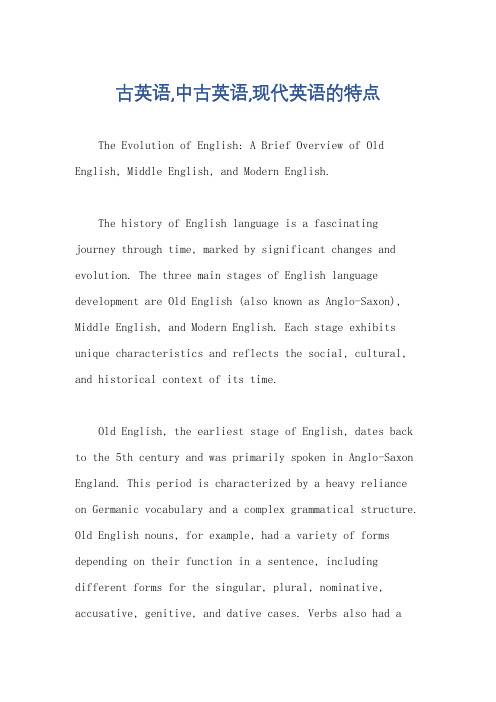
古英语,中古英语,现代英语的特点The Evolution of English: A Brief Overview of Old English, Middle English, and Modern English.The history of English language is a fascinating journey through time, marked by significant changes and evolution. The three main stages of English language development are Old English (also known as Anglo-Saxon), Middle English, and Modern English. Each stage exhibits unique characteristics and reflects the social, cultural, and historical context of its time.Old English, the earliest stage of English, dates back to the 5th century and was primarily spoken in Anglo-Saxon England. This period is characterized by a heavy reliance on Germanic vocabulary and a complex grammatical structure. Old English nouns, for example, had a variety of forms depending on their function in a sentence, including different forms for the singular, plural, nominative, accusative, genitive, and dative cases. Verbs also had awide range of forms to express different tenses, moods, and voices.The vocabulary of Old English was primarily Germanic, but it also borrowed words from other languages,particularly Latin and Norse. This borrowing was due to the influence of the Roman Empire and the Viking invasions of England. Old English literature, such as the Beowulf epic, displays a rich and varied vocabulary, as well as a complex grammatical structure.Middle English, which spanned from the 11th to the 15th century, saw significant changes in both vocabulary and grammar. The Norman invasion of England in 1066 introduced a new ruling class that spoke French, resulting in a large influx of French words into the English language. This influx, along with the influence of other languages such as Latin and Greek, led to a significant increase in the size and diversity of the English vocabulary.Grammatically, Middle English saw a simplification of the Old English grammatical system. The number of nounforms was reduced, and the system of verb conjugation became less complex. Adjectives also began to lose their grammatical gender and number forms. These changes made English grammar easier to learn and use, especially for those who were not native speakers.The Renaissance period in the 15th century marked a further change in English, with a renewed interest in classical literature and a focus on the refinement of the language. This period saw the emergence of Early Modern English, which was characterized by a more standardized spelling system and a more consistent grammar.Modern English, which began in the 16th century and continues to the present day, is the result of further changes and evolution. The Industrial Revolution, the growth of empires, and the development of new technologies all had a profound impact on the language. The standardization of spelling and grammar, the expansion of vocabulary, and the influence of other languages have all contributed to the development of Modern English.Modern English is characterized by a wide range of dialects and accents, reflecting the diverse cultural and geographical backgrounds of its speakers. The vocabulary of Modern English is vast and diverse, with words borrowed from many different languages. The grammar of Modern English is relatively simple compared to Old English, with fewer noun forms and a more consistent system of verb conjugation.In conclusion, the history of English language is a fascinating journey through time, marked by significant changes and evolution. Old English, Middle English, and Modern English each exhibit unique characteristics that reflect the social, cultural, and historical context of their respective periods. From the complexity of Old English grammar to the simplicity of Modern Englishspelling and grammar, the evolution of English language is a testament to the adaptability and resilience of human language.。
英语发展史
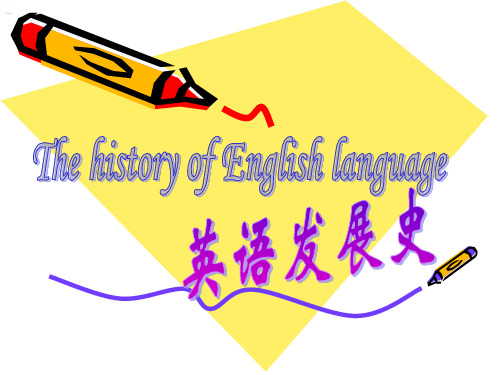
英 译 汉
在8世纪末,斯堪的那维亚人攻占英国。 战 争持续了将近200年。 在这个时期,很多 拉丁语、丹麦和古斯堪的那维亚的单词融入 英语。象炊具和杯子与生活息息相关一样, 拉丁语给了英语很多单词。从丹麦语和古斯 堪的那维亚语中,英国人借鉴过来了皮肤、 腿、以及各种词格的代词"他们"、"他们的"。 来自古斯堪的那维亚语的很多同义词统一到 英语中,例如,愤怒(英语的wrath和古斯堪 的那维亚语的anger);生病(英语的sick和古 斯堪的那维亚语的ill),都在英语中进行了统 一。
大量的法语词的涌入,也使英 语词汇起了词义变化。有一些英语 固有的词被淘汰掉了,有一些虽然 还存在,但词义范围有所改变,或 者带上特有的文体色彩和感情色彩。 例如:wed在古英语中作“结婚”解, 但在中古英语时期传入了法语 词”merry”,英语中“结婚”这一 意义渐渐由marry来表示,wed只用 在引申意义中了;它的动名词 wedding还是一个常用的词,但只限 于指“婚礼”。带有不同文体意义 的பைடு நூலகம்语本族语词与法语并存,组成 了英语中特有的同义词群格式。
The language historian divides English history into three times:
1、Ancient English
(又称盎格鲁-萨克森时期公元450—1100年)
The history of the English language began over 1500 years ago in the north of Europe. Around the fifth century A.D., tribes of people known as the Angels, Saxons, and Jutes traveled west from Germany and Denmark across the North Sea. They settled in Britain, and by the late seventh century, they were speaking an early form of the English.
历史英语作文模板
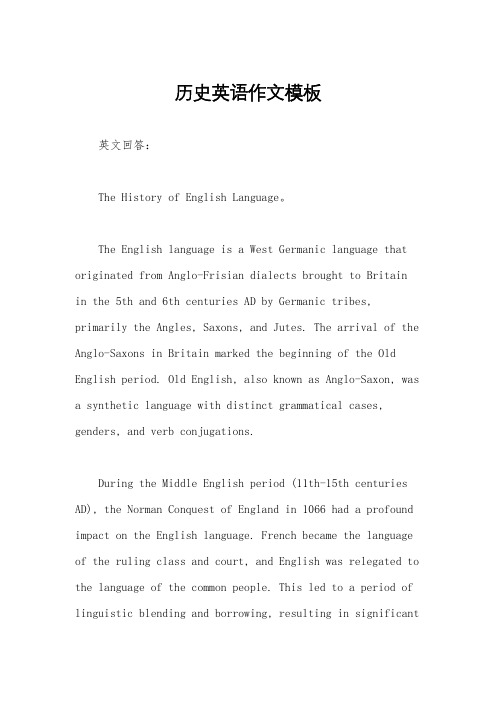
历史英语作文模板英文回答:The History of English Language。
The English language is a West Germanic language that originated from Anglo-Frisian dialects brought to Britainin the 5th and 6th centuries AD by Germanic tribes, primarily the Angles, Saxons, and Jutes. The arrival of the Anglo-Saxons in Britain marked the beginning of the Old English period. Old English, also known as Anglo-Saxon, was a synthetic language with distinct grammatical cases, genders, and verb conjugations.During the Middle English period (11th-15th centuries AD), the Norman Conquest of England in 1066 had a profound impact on the English language. French became the language of the ruling class and court, and English was relegated to the language of the common people. This led to a period of linguistic blending and borrowing, resulting in significantchanges to the vocabulary, spelling, and pronunciation of English.The Early Modern English period (15th-17th centuries AD) saw the standardization of the English language and therise of London as the center of political and economic power. The development of the printing press and the workof notable writers such as William Shakespeare, John Milton, and Francis Bacon contributed to the standardization and enrichment of the language.The Modern English period (18th century AD onwards) witnessed the expansion of the British Empire, which led to the spread of English as a global language. The rise of industrialization and the growth of trade and commerce further contributed to the expansion and diversification of English.Today, English is the third most spoken native language in the world, with approximately 373 million nativespeakers and over 1 billion total speakers worldwide. It is the official language in over 60 countries and is usedextensively in business, education, and diplomacy.Chinese 回答:英语语言史。
A-Brief-History-of-English
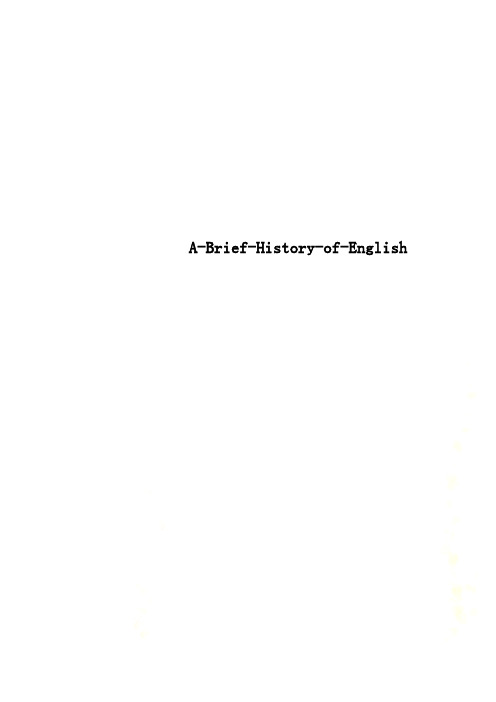
A-Brief-History-of-EnglishA Brief History of EnglishN o understanding of the English language can be very satisfactory without a notion of the history of the language. But we shall have to make do with just a notion. The history of English is long and complicated, and we can only hit the higl1 spots.不了解英语的历史很难真正掌握这门语言,然而对此我们只能做到略有所知。
因为英语的历史既漫长又复杂,我们只能抓住其发展过程中的几个关键时期。
At the time of the Ro1nan Empire, the speakers of what was to become English were scattered along the northern coast of Europe. They spoke a dialect of Low German. More exactly, they spoke several different dialects, since they were several different tribes. The names given to the tribes who got to England are Angles, Saxons, and Jutes, who are referred to collectively as Anglo-Saxons4.在罗马帝国时期,散居在欧洲北部沿海的居民说一种西部德语的方言,这就是英语的前身。
更确切地说,由于隶属于不同的部落,他们说的是几种不同的方言。
The history of English language(英汉双语)
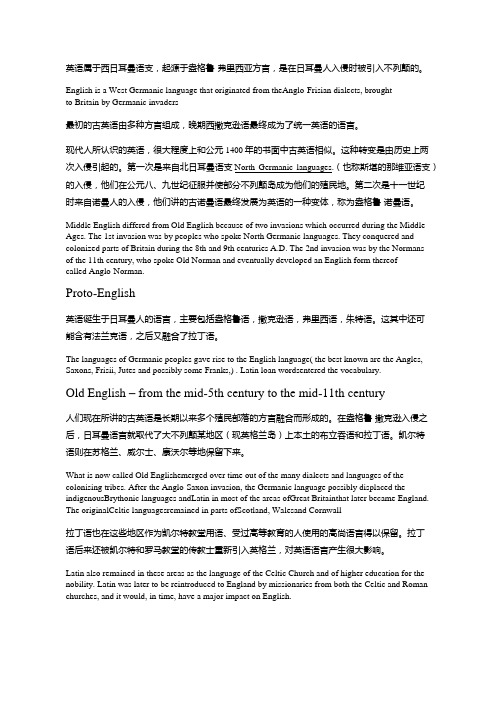
英语属于西日耳曼语支,起源于盎格鲁-弗里西亚方言,是在日耳曼人入侵时被引入不列颠的。
English is a West Germanic language that originated from theAnglo-Frisian dialects, broughtto Britain by Germanic invaders最初的古英语由多种方言组成,晚期西撒克逊语最终成为了统一英语的语言。
现代人所认识的英语,很大程度上和公元1400年的书面中古英语相似。
这种转变是由历史上两的入侵,他们在公元八、九世纪征服并使部分不列颠岛成为他们的殖民地。
第二次是十一世纪时来自诺曼人的入侵,他们讲的古诺曼语最终发展为英语的一种变体,称为盎格鲁-诺曼语。
Middle English differed from Old English because of two invasions which occurred during the Middle Ages. The 1st invasion was by peoples who spoke North Germanic languages. They conquered and colonized parts of Britain during the 8th and 9th centuries A.D. The 2nd invasion was by the Normans of the 11th century, who spoke Old Norman and eventually developed an English form thereofcalled Anglo-Norman.Proto-English英语诞生于日耳曼人的语言,主要包括盎格鲁语,撒克逊语,弗里西语,朱特语。
这其中还可能含有法兰克语,之后又融合了拉丁语。
The languages of Germanic peoples gave rise to the English language( the best known are the Angles, Saxons, Frisii, Jutes and possibly some Franks,) . Latin loan wordsentered the vocabulary.Old English – from the mid-5th century to the mid-11th century人们现在所讲的古英语是长期以来多个殖民部落的方言融合而形成的。
A History of the English Language
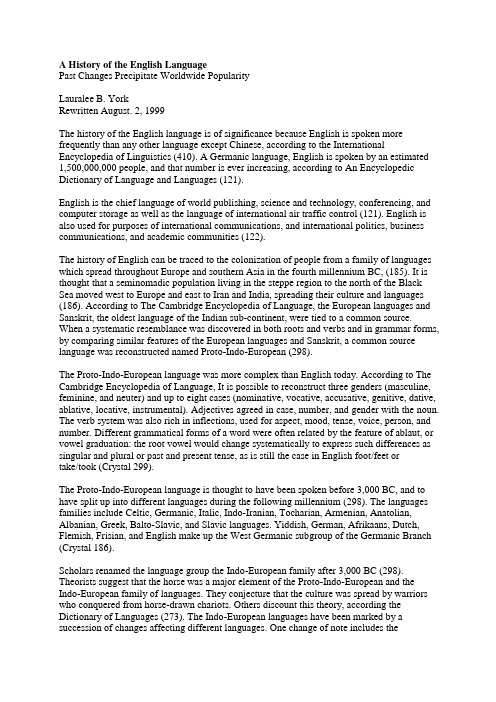
A History of the English LanguagePast Changes Precipitate Worldwide PopularityLauralee B. YorkRewritten August. 2, 1999The history of the English language is of significance because English is spoken more frequently than any other language except Chinese, according to the International Encyclopedia of Linguistics (410). A Germanic language, English is spoken by an estimated 1,500,000,000 people, and that number is ever increasing, according to An Encyclopedic Dictionary of Language and Languages (121).English is the chief language of world publishing, science and technology, conferencing, and computer storage as well as the language of international air traffic control (121). English is also used for purposes of international communications, and international politics, business communications, and academic communities (122).The history of English can be traced to the colonization of people from a family of languages which spread throughout Europe and southern Asia in the fourth millennium BC, (185). It is thought that a seminomadic population living in the steppe region to the north of the Black Sea moved west to Europe and east to Iran and India, spreading their culture and languages (186). According to The Cambridge Encyclopedia of Language, the European languages and Sanskrit, the oldest language of the Indian sub-continent, were tied to a common source. When a systematic resemblance was discovered in both roots and verbs and in grammar forms, by comparing similar features of the European languages and Sanskrit, a common source language was reconstructed named Proto-Indo-European (298).The Proto-Indo-European language was more complex than English today. According to The Cambridge Encyclopedia of Language, It is possible to reconstruct three genders (masculine, feminine, and neuter) and up to eight cases (nominative, vocative, accusative, genitive, dative, ablative, locative, instrumental). Adjectives agreed in case, number, and gender with the noun. The verb system was also rich in inflections, used for aspect, mood, tense, voice, person, and number. Different grammatical forms of a word were often related by the feature of ablaut, or vowel graduation: the root vowel would change systematically to express such differences as singular and plural or past and present tense, as is still the case in English foot/feet ortake/took (Crystal 299).The Proto-Indo-European language is thought to have been spoken before 3,000 BC, and to have split up into different languages during the following millennium (298). The languages families include Celtic, Germanic, Italic, Indo-Iranian, Tocharian, Armenian, Anatolian, Albanian, Greek, Balto-Slavic, and Slavic languages. Yiddish, German, Afrikaans, Dutch, Flemish, Frisian, and English make up the West Germanic subgroup of the Germanic Branch (Crystal 186).Scholars renamed the language group the Indo-European family after 3,000 BC (298). Theorists suggest that the horse was a major element of the Proto-Indo-European and theIndo-European family of languages. They conjecture that the culture was spread by warriors who conquered from horse-drawn chariots. Others discount this theory, according the Dictionary of Languages (273). The Indo-European languages have been marked by a succession of changes affecting different languages. One change of note includes thecentum/satem split. K followed by a front vowel became s or sh in Indo-Aryan (Sanskrit sata), Iranian (Persian sad), Slavonic (Russian sto), Baltic (Lithuanian simtas), Albanian (qind, pronounced chind) and Armenian. It remained k in Celtic (Welsh cant), Italic, Tocharian (kant), Greek (hetaton) and Germanic (with a subsequent move to h, English hundred).A sound shift in consonants occurred that differentiated the Proto-Germanic languages from other Indo-European languages. It included several consonants that were changed from the first example to the second example in the following consonants: p>f, t>0, k>x, b>p, d>t, g>k, bh>b, dh>d, and gh>h. The sound shift was named Grimms Law, after the man who described it, according to Contemporary Linguistics (332).The Proto-Indo-European, the Indo-European, and specifically the Germanic language, of which English is a derivative, influenced the early history of the English Language. The early history of the English language began in Britain and with several groups of people. At first people migrated to the placed now called England. Several invading groups joined the original settlers of England, bringing with them their language and culture. English became a mixture of languages that adapted to the circumstances and the needs of the people. England eventually commanded an empire, thus, spreading the language around the world. When the empire, diminished the Americas continued to spread the English language because of their political power and wealth. The history of the English language is fascinating and follows as events and language changes are pointed out.The Celts were the first Indo-European people to spread across Europe, according The Cambridge Encyclopedia of Language (304). They emerged from south central Europe and spread throughout most of Europe, reaching the Black Sea and Asia Minor. They migrated to south-west Spain, central Italy, and throughout Britain in a series of wave-like migrations. Their culture was named after a Swiss archaeological site called La Tene.The first group of Celts went to Ireland in the 4th century and later reached Scotland and the Isle of Man. The second group went into southern England and Wales, and later to Brittany, producing a type of Celtic know as British.During the greatest days of the Roman Empire, their law ruled all men from Britain to Egypt, from Spain to the Black Sea, according to A History of Knowledge, (67). The Romans had a fierce respect and love of the law. Everywhere the Romans governed, they took their laws and administered them over the peoples they ruled. In fact, Roman law continues to this day to be an influence upon almost all legal systems in the Western world. The Romans adopted the Greek alphabet, Greek ideas, images and world views. They copied the Macedonian order of battle and Spartan steel weapons and armor. They conquered everywhere they went, building roads, establishing cities, trading, and sharing their culture. The Romans build a transportation network with hundreds of miles of roadway. The roads the Romans built still exist today, after twenty centuries of continuous use.Britain was acquired as a province of the Roman Empire during the century after 14 AD, following the death of Augustus. Words from Latin and Greek languages were adopted into the language. The Greek alphabet, with a few minor changes, is used in the English language today (25). Eventually, the Romans also brought Christianity to Britain. English became a distinct tongue about 449 AD when Angles, Saxons, and Jutes, who spoke Germanic dialects, arrived in Celtic-speaking Britain. Groups of Angles, Saxons, and Jutes came to aid the Romanized Britons who were besieged by Picts and Scots after the Roman military withdrewin 410 AD (Bright 410). English owes its origin to the Angles, Saxons, and Jutes who crossed the sea and settled in Britain, according to the Dictionary of Languages, (166). The Anglo-Saxon kingdoms covered most of what is now England by around 600 AD.The West Saxons were the most powerful of the new kingdoms, and the only one able to withstand the Viking invasion in the 9th century AD. It was also in Wessex or the West Saxon kingdom that a written language first flourished. The International Encyclopedia of Linguistics divides the history of English into three periods: Old English, Anglo-Saxon from 700 to 1100 AD, Middle English from 1100 to 1500 AD, and Modern English or New English from 1500 to the present (410).Old English (OE) was a highly inflected language. There were suffixes on nouns, verbs, adjectives, and demonstratives. It had an elaborate system of personal interrogative and relative pronouns. The four dialects during the Old English period were Kentish in the southeast, West Saxon in the south and southwest, Mercian in the Midlands, and Northumbrian above the Humber River. West Saxon was the written standard during the reign of Alfred the Great from 871 to 899 AD.Old English morphology included noun forms of singulars and plurals, with five cases, and three genders. Old English personal pronouns have been retained, and have transferred into New English, more of their morphological variations than any other form class.With the influx of the Christian religion at the end of the 6th century, some Latin words were added. About 2,000 Danish words and phrases were also added to Old English. At that time, the combining of native elements in prefixing, suffixing, and compounding was the most characteristic way of expanding the word stock. (Bright, 412)Britain was invaded again during the Viking age of about 750 to 1050. This invasion was mostly by Danes who then settled in central and southern England. Throughout Britain, most of the people spoke Old English and few words from the Celtic influence remained. Middle English began with the 1066 Norman Conquest. French-speaking Normans carried out government and educational duties. The Norman invasion caused a bilingual environment with the middle class speaking both French and English. It brought approximately 10,000 Norman French words into Middle English. The Normans exerted a great influence in food, fashion, education, religion, government, law, and the military.Social and linguistic upheaval changed the language climate in 1215 when King John of England was forced to acknowledge the Magna Carta. According to The Heritage of World Civilizations, this monumental document was a victory of feudal over monarchical power in the sense that it secured the rights of many the nobility, the clergy and the townspeople over the autocratic king; it restored the internal balance of power that had been the English political experience since the Norman conquest. Now the English people could be represented at the highest levels of government. This eventually brought English back into use as the countrys language (446-447).Modern English developed when Caxton established his printing press at Westminister in 1476. New English is a derivative of the dialect of medieval London. It is in the same dialect used by Cha cer and Chancery. During this time Johannes Gutenberg, a German printer invented type molds for casting individual letters. His first book using movable type was printed about 1450 and was printed on rag paper. (The Chinese government is credited withthe discovery of paper in 105 AD, however, Arabs also discovered how to make paper.) Gutenbergs invention made movable type practical because he could produce any quantity of letters and words and place the timeype in a frame. He used rag paper in his printings. His most famous printing is the Gutenberg Bible (Van Doren 154).According to the International Encyclopedia of Linguistics, all vowels were systematically raised, and the highest were dipthongized between 1400 and 1564. Also, there were 333 strong verbs in Old English. Half of the verbs are still used, although, only 68 are inflected as strong verbs (414). The most important phonological event in modern times is the so-called Great Vowel Shift. It began in late middle English and continued until the eighteenth century. The long vowels of Middle English came to be pronounced in a higher position, while the highest vowels became diphthongs, according to The Encyclopedia of Language and Linguistics (1125).With the approach of the 18th century, English became an analytical language. Its rich inflectional system weakened, causing a great increase in the use of prepositional phrases, in new phrasal prepositions (e.g. in spite of, with regard to, on the basis of), and in periphrastic verb construction. For example, did say is the periphrastic past tense of say, and said is the inflected past tense of say. During this period, there was a reduction of inflectional distinctions (Asher 1125). Also, Old English had used both SVO and SOV sentence word orders without requiring a grammatical subject. Middle English used SVO and the subject was obligatory (Bright 413).During the Renaissance, English displaced Latin as the language used in philosophy, science, and other learned arenas. Since English was lexically deficient, it borrowed Latin and Greek words for nouns and adjectives. The International Encyclopedia of Linguistics estimated that during the first 150 years of New English, more than 10,000 words from 50 languages were borrowed. It also asserted that the current English language has borrowed foreign words from more than 75 languages with French as the principal donor. The Old English method of using affixes and compounding to form words was displaced in New English by borrowing words as the favorite way of enlarging the English word stock. According to the Dictionary of Languages, the history of Modern English has three important themes. The themes include the extension of English into new subject areas, the spread of English to many parts of the world, and the growth of English into Standard British English.The extension of the language began with the first printed English translation of the Bible in 1525. The Authorized Version of the English Bible was translated in 1611. Finally, the revised Book of Common Prayer was published in 1662. The Bible and the prayer book were in everyday use in Anglican churches until the 1970(s), where they influenced the speaking and writing of English for over 300 years. English took the place of Latin during the 16th century in religion, science, and scholarship. To make this transition possible, vast numbers of loan words have been added to the English language.English has spread to many parts of the world. It became a native language for English-speaking colonies, which are now independent and powerful states. English was spread by British trade and influence. It is the second language of many other states because the ex-colonial countries have no better choice of a national language. English is currently acknowledged as the universal language of diplomacy and science. It is also the language that people usually speak when addressing foreigners, and it is the most popular second language(167).Standard British English is the widely accepted standard language, the language of London and its elite. It is sometimes called the Kings (or Queens) English, BBC English, and Received Pronunciation. This standard use of English has been helped by the spread of education and literacy, the extension of printing and publishing, and recently the influence of radio and television. All these factors have increased the standardization of pronunciation, spelling, and spoken and written style.English shares linguistic features with other Indo-European languages. However, the lexicon, morphology, and phonology are characteristically Germanic. One example of this is that past tense inflections are a Germanic characteristic. Another distantly Germanic characteristic is the fixed primary stress on the first syllable, as expressed in the word brother (Bright 410). An Encyclopedia Dictionary of Language and Languages (AEDLL) describes English as spoken worldwide by a large and ever-increasing number of people. The English language has official status in more than 60 countries. Two diagrams called A Family of Languages and English: the world language follow the bibliography. One shows that English is listed with languages in the West Germanic subgroup, and the other illustrates the use of English in countries around the world today. A summary of the trends allows the prediction that English may become the language of universal communications.BibliographyAsher, R.E. and J. M. Y. Simpson. The Encyclopedia of Language and Linguistics. 10 Vols. New York: Pergamon Press, 1994. 1125.Bright, William. International Encyclopedia of Linguistics. 4 Vols. New York: Oxford University Press, 1992. 410-415.Craig, Albert M., et al., eds., et The Heritage of World Civilizations. 2 Vols. New York: Macmillan Publishing Company, 1986. 446-447.Crystal, David, The Cambridge Encyclopedia of Language. 2nd Ed. New York: The Press Syndicate of the University of Cambridge, 1997. 298-299.Crystal, David. An Encyclopedia Dictionary of Language and Languages. USA: Blackwell Publishers, 1992. 121-122, 134, 185-186.Dalby, Andrew. Dictionary of Languages: The Definitive Reference to more than 400 Languages. London: Bloomsbury Publishing PLC, 1998.166-179.OGrady, William, Michael Dobrovolsky and Mark Aronoff. Contemporary Linguistics. 3rd Ed. New York: St. Martins Press, Inc., 1992. 332.Van Doren, Charles. A History of Knowledge Past, Present, and Future. New York: Ballantine Books, 1992. 154.。
英语的历史
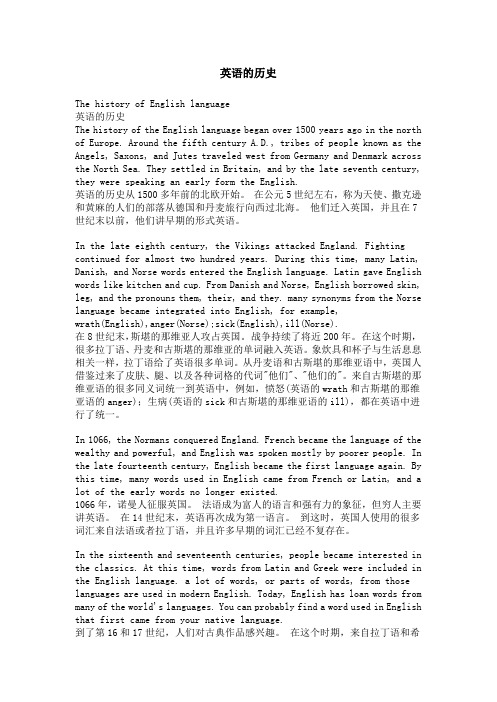
英语的历史The history of English language英语的历史The history of the English language began over 1500 years ago in the north of Europe. Around the fifth century A.D., tribes of people known as the Angels, Saxons, and Jutes traveled west from Germany and Denmark across the North Sea. They settled in Britain, and by the late seventh century, they were speaking an early form the English.英语的历史从1500多年前的北欧开始。
在公元5世纪左右,称为天使、撒克逊和黄麻的人们的部落从德国和丹麦旅行向西过北海。
他们迁入英国,并且在7世纪末以前,他们讲早期的形式英语。
In the late eighth century, the Vikings attacked England. Fighting continued for almost two hundred years. During this time, many Latin, Danish, and Norse words entered the English language. Latin gave English words like kitchen and cup. From Danish and Norse, English borrowed skin, leg, and the pronouns them, their, and they. many synonyms from the Norse language became integrated into English, for example,wrath(English),anger(Norse);sick(English),ill(Norse).在8世纪末,斯堪的那维亚人攻占英国。
英语四级阅读15篇
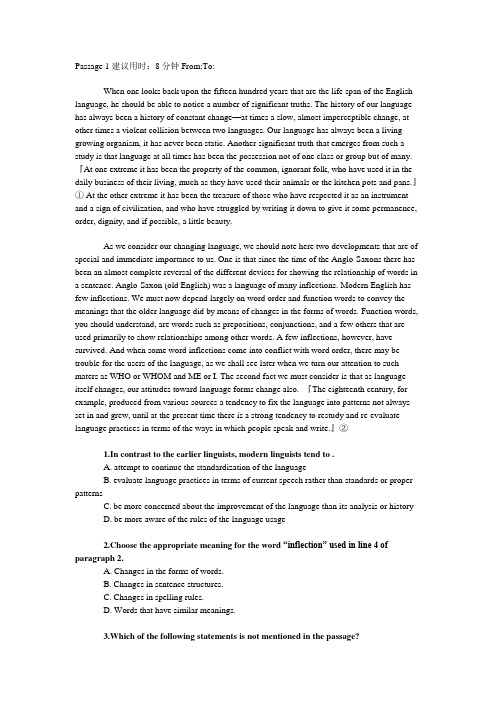
Passage 1建议用时:8分钟From:To:When one looks back upon the fifteen hundred years that are the life span of the English language, he should be able to notice a number of significant truths. The history of our language has always been a history of constant change—at times a slow, almost imperceptible change, at other times a violent collision between two languages. Our language has always been a living growing organism, it has never been static. Another significant truth that emerges from such a study is that language at all times has been the possession not of one class or group but of many. 『At one extreme it has been the property of the common, ignorant folk, who have used it in the daily business of their living, much as they have used their animals or the kitchen pots and pans.』① At the other extreme it has been the treasure of those who have respected it as an instrument and a sign of civilization, and who have struggled by writing it down to give it some permanence, order, dignity, and if possible, a little beauty.As we consider our changing language, we should note here two developments that are of special and immediate importance to us. One is that since the time of the Anglo-Saxons there has been an almost complete reversal of the different devices for showing the relationship of words in a sentence. Anglo-Saxon (old English) was a language of many inflections. Modern English has few inflections. We must now depend largely on word order and function words to convey the meanings that the older language did by means of changes in the forms of words. Function words, you should understand, are words such as prepositions, conjunctions, and a few others that are used primarily to show relationships among other words. A few inflections, however, have survived. And when some word inflections come into conflict with word order, there may be trouble for the users of the language, as we shall see later when we turn our attention to such maters as WHO or WHOM and ME or I. The second fact we must consider is that as language itself changes, our attitudes toward language forms change also. 『The eighteenth century, for example, produced from various sources a tendency to fix the language into patterns not always set in and grew, until at the present time there is a strong tendency to restudy and re-evaluate language practices in terms of the ways in which people speak and write.』②1.In contrast to the earlier linguists, modern linguists tend to .A. attempt to continue the standardization of the languageB. evaluate language practices in terms of current speech rather than standards or proper patternsC. be more concerned about the improvement of the language than its analysis or historyD. be more aware of the rules of the language usage2.Choose the appropriate meaning for the word “inflection” used in line 4 of paragraph 2.A. Changes in the forms of words.B. Changes in sentence structures.C. Changes in spelling rules.D. Words that have similar meanings.3.Which of the following statements is not mentioned in the passage?A. It is generally believed that the year 1500 can be set as the beginning of the modern English language.B. Some other languages had great influence on the English language at some stages of its development.C. The English language has been and still in a state of relatively constant change.D. Many classes or groups have contributed to the development of the English language.4. The author of these paragraphs is probably a(an) .A. historianB. philosopherC. anthropologistD. linguist5.Which of the following can be best used as the title of the passage?A. The history of the English language.B. Our changing attitude towards the English language.C. Our changing language.D. Some characteristics of modern English.Vocabulary1.span n. 跨度,范围,一段时间,期间2.imperceptible adj. 感觉不到的,觉察不到的,极细微的anism n. 生物体,有机体4.possession n. 拥有,占有,领土,领地5.ignorant adj. 无知的6.folk n. 人们,民族7.permanence n. 永久,持久8.Anglo-Saxons n. 盎格鲁—撒克逊语,盎格鲁—撒克逊人,地道的英国人9.reversal n. 颠倒,反向,逆转10.inflection n. 词尾变化11.preposition n. 前置词,介词12.conjunction n. 联合,关联,连接词13.in terms of 根据,按照,用……的话,在……方面长难句解析①【解析】“who”引导非限制性定语从句,修饰“the common, ignorant folk”。
the history of English language英语语言发展历史

•
The history of the English language really started with the arrival of three Germanic tribes who invaded Britain during the 5th century AD. These tribes, the Angles, the Saxons and the Jutes, crossed the North Sea from what today is Denmark and northern Germany. At that time the inhabitants of Britain spoke a Celtic language. But most of the Celtic speakers were pushed west and north by the invaders - mainly into what is now Wales, Scotland and Ireland. The Angles came from Englaland and their language was called Englisc - from which the words England and English are derived. • 英语真正的历史应该从公元5世纪时入侵英国的三个日耳曼部 落说起. 这几个部落分别是, 盎格鲁人, 撒克逊人,和朱特人,他 们从今天的德国北部和丹麦出发,然后横渡北海。那时候英国 的本地居民都说凯尔特语。但由于入侵者的逼迫,他们都被赶 到了西部和北部-主要是现在的威尔士,苏格兰和爱尔兰。盎格 鲁人来自 Englaland 他们的语言称为 Englisc (古英语) - 这两个 词就是现在England和English的前身。
高中英语 Unit 2 English around the world Period One Wa

课文预读 回归教材 萃取文本主旨
阅读课文,匹配段落大意
Para.1 ( B ) A.All languages change when cultures communicate with one another.So does English.
Para.2 ( C ) B.How English spread(传播) in the past. Para.3 ( A ) C.Native English speakers can understand each other
答案
课文阅读理解 1 2 3 4 5 1.Where did most of the English speakers live at the end of the 16th century? A.America. B.England. C.South Asia. D.South Africa. 答案 B
阅读短文,回答下列问题 1.The main idea of the text is the history of the English language . 2.Fill in the blank in Paragraph 3 with proper words. _b_e_c_a_m_e__a_m__a_in__l_a_n_g_u_a_g_e__ 3.What’s the main difference between Early Modern English and Late Modern English? _V_o_c_a_b_u_l_a_ry_._
even if they don’t speak the same kind of English. Para.4 ( D ) D.By the 19th century,two big changes in English
AHistoryoftheEnglishLanguage
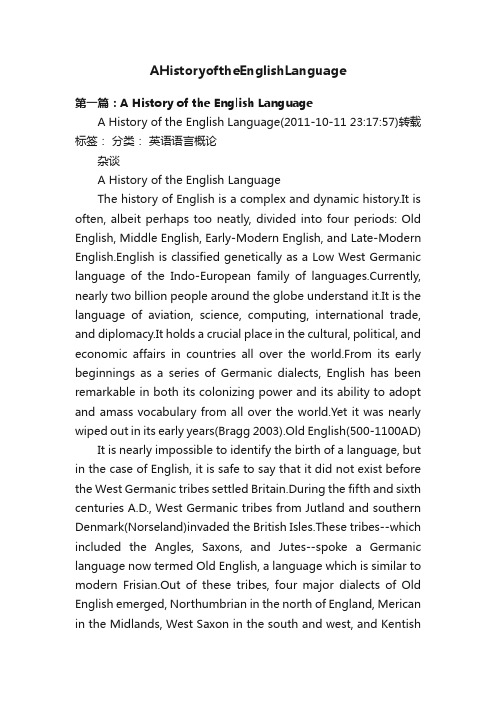
AHistoryoftheEnglishLanguage第一篇:A History of the English LanguageA History of the English Language(2011-10-11 23:17:57)转载标签:分类:英语语言概论杂谈A History of the English LanguageThe history of English is a complex and dynamic history.It is often, albeit perhaps too neatly, divided into four periods: Old English, Middle English, Early-Modern English, and Late-Modern English.English is classified genetically as a Low West Germanic language of the Indo-European family of languages.Currently, nearly two billion people around the globe understand it.It is the language of aviation, science, computing, international trade, and diplomacy.It holds a crucial place in the cultural, political, and economic affairs in countries all over the world.From its early beginnings as a series of Germanic dialects, English has been remarkable in both its colonizing power and its ability to adopt and amass vocabulary from all over the world.Yet it was nearly wiped out in its early years(Bragg 2003).Old English(500-1100AD) It is nearly impossible to identify the birth of a language, but in the case of English, it is safe to say that it did not exist before the West Germanic tribes settled Britain.During the fifth and sixth centuries A.D., West Germanic tribes from Jutland and southern Denmark(Norseland)invaded the British Isles.These tribes--which included the Angles, Saxons, and Jutes--spoke a Germanic language now termed Old English, a language which is similar to modern Frisian.Out of these tribes, four major dialects of Old English emerged, Northumbrian in the north of England, Merican in the Midlands, West Saxon in the south and west, and Kentishin the Southeast.These tribes, along with the English language, may well have been wiped out altogether by Viking raiders if not for a Wessex king named Alfred the Great.After defeating the Vikings, who threatened both the English way of life and its language, Alfred the Great encouraged English literacy throughout his kingdom(McCrum, et al 1986).Before the Germanic tribes arrived, the Celts were the original inhabitants of Britain.When the Germanic tribes invaded England, they pushed the Celt-speaking inhabitants out of England into what is now Scotland, Wales, Cornwall, and Ireland.The Celtic language survives today in the Gaelic languages, and some scholars speculate that the Celtic tongue might have influenced the grammatical development of English, though the influence would have been minimal(Bryson 1990).Around A.D.850, Vikings or Norsemen made a significant impact on the English language by importing many North Germanic words into the language.From the middle of the ninth century, large numbers of Norse invaders settled in Britain, especially in the northern and eastern areas and, in the eleventh century, a Danish(Norse)King, Canute, ruled England.The North Germanic speech of the Norsemen had a fundamental influence on English.They added basic words such as “that,” “they,” and “them,” and also may have been responsible for some of the morphological simplification of Old English, including the loss of grammatical gender and cases(Bragg 2003).The majority of words that constitute Modern English do not come from Old English roots(only about one sixth of known Old English words have descendants surviving today), but almost all of the 100 most commonly used words in modern English do have Old English roots.Words like “water,” “strong,” “the,” “of,” “a,” “he”“no” and many other basic modern English words derive from Old English(Bragg 2003).Still, the English language we know today is a far cry from its Old English ancestor.This is evidenced in the epic poem Beowulf, which is the best known surviving example of Old English(McCrum, et al 1986), but which must be read in translation to modern English by all but those relative few who have studied the work in the original.The Old English period ended with the Norman Conquest, when the language was influenced to an even greater extent by the French-speaking Normans.The Norman Conquest and Middle English(1100-1500)In 1066, William the Conqueror, Duke of Normandy, invaded and conquered England and the Anglo-Saxons.After the invasion, the Norman kings and the nobility spoke a dialect of Old French known as Anglo-Norman, while English continued to be the language of the common people.This class distinction can still be seen in the English language today in words such as “beef” vs.“cow” and “pork” vs.“pig.” The aristocracy commonly ate beef and pork, which are derivatives of Anglo-Norma, while the Anglo-Saxon commoners, who tended the cattle and hogs, retained the Germanic and ate cow and pig.Many legal terms, such as “indict,” “jury,” and “verdict” also have Anglo-Norman roots because the Normans ruled the courts.It was not uncommon for French words to replace Old English words;for example, “uncle” replaced “eam” and “crime” replaced “firen.” French and English also combined to form new words, such as the French “gentle” and the Germanic “man” forming “gentleman”(Bryson1990).To this day, French-based words hold a more official connotation than do Germanic-based ones.When the English King John lost the province of Normandy to the King of France in 1204, the Normannobles of England began to lose interest in their properties in France and began to adopt a modified English as their native tongue.When the bubonic plague devastated Europe, the dwindling population served to consolidate wealth.The old feudal system crumbled as the new middle class grew in economic and social importance as did their language in relation to Anglo-Norman.The highly inflected system of Old English gave way to, broadly speaking, the same system of English found today which, unlike Old English, does not use distinctive word endings.Unlike Old English, Middle English can be read(albeit with some difficulty)by modern English speakers.By 1362, the linguistic division between the nobility was largely over and the Statue of Pleading was adopted, making English the language of the courts and Parliament.Edward the III became the first king to address Parliament in English in 1362, and the first English government document to be published in English since the Norman Conquest was the Provisions of Oxford.And the most famous literary example of Middle English is Chaucer’s Canterbury Tales.The Middle English period came to a close around 1500 with the rise of Modern English(McCrum, et al 1986).Early Modern English(1500-1800)The Renaissance brought with it widespread innovation in the English language.The rediscovery of classical scholarship created an influx of classical Latin and Greek words into the language.While Latin and Greek borrowings diversified the language, some scholars adopted Latin terms awkwardly and excessively, leading to the derogatory term “inkhorn.” An important item for scholars, an inkhorn was simply a horn pot that held ink for quills...but later it became a deprecatory term for pedantic writers who borrowed obscure and opulent termssuch as “revoluting” and “ingent affability”(Bragg 2003).The invention of the printing press also marked the division from Old English to Modern English as books became more widespread and literacy increased.Soon publishing became a marketable occupation and books written in English were often more popular than books in Latin.The printing press also served to standardize English.The written and spoken language of London already influenced the entire country, and with the influence of the printing press, London English soon began to dominate.Indeed, London standard became widely accepted, especially in more formal context.Soon English spelling and grammar were fixed and the first English dictionary was published in 1604(Bryson 1990).In the fifteenth century, the Great Vowel Shift--a series of changes in English pronunciation--further changed the English language.These purely linguistic sound changes moved the spoken language away from the so-called “pure” vowel sounds which still characterize many Continental languages today.Consequently, the phonetic pairings of most long and short vowel sounds were lost, resulting in the oddities of English pronunciation and obscuring the relationship of many English words and their foreign roots.The Great Vowel Shift was rather sudden and the major changes occurred within a century, though the shift is still in process and vowel sounds are still shortening, albeit much more gradually.The causes of the shift are highly debated.Some scholars argue that such a shift occurred due to the “massive intake of Romance loanwords so that English vowels started to sound more like French loanwords.Other scholars suggest it was the loss of inflectional morphology that started the shift”(Bragg 2003).Late-Modern English(1800-Present)The pronunciation, grammar, and spelling of Late-Modern English are essentially the same as Early-Modern English, but Late-Modern English has significantly more words due to several factors.First, discoveries during the scientific and industrial revolutions created a need for a new vocabulary.Scholars drew on Latin and Greek words to creat e new words such as “oxygen,” “nuclear,” and “protein.” Scientific and technological discoveries are still ongoing and neologisms continue to this day, especially in the field of electronics and computers.Just as the printing press revolutionized both spoken and written English, the new language of technology and the Internet places English in a transition period between Modern and Postmodern.Second, the English language has always been a colonizing force.During the medieval and early modern periods, the influence of English quickly spread throughout Britain, and from the beginning of the seventeenth century on, English began to spread throughout the world.Britain’s maritime empire and military influence on language(especially after WWII)has consequently been significant.Britain’s complex colonization, exploration, and overseas trade both imported loanwords from all over the world(such as “shampoo,” “pajamas,” and “yogurt”)and also led to the development of new varieties of English, each with its own nuances of vocabulary, grammar, and pronunciation.Significantly, one of England’s colonies, America, created what is known as American English and, in some respects, American English is closer to the English of Shakespeare than the modern Standard British English(or the modern Queen’s English)because many Americanisms are originally British expressions that were preserved in the colonies while lost at home(e.g., “trash” for “rubbish”).Native American andSpanish vocabulary have also been a great influence on American English, importing or adopting such words as “raccoon,” “canoe,” “mustang,” “ranch,” and “vigilante”(Bragg 2003).Global EnglishRecently, English has become a lingua franca, a global language that is regularly used and understood by many countries where English is not the first/native language.In fact, when Pope John Paul II went to the Middle East to retrace Christ’s footsteps and addressed Christians, Muslims, and Jews, the Pope didn’t speak Arabic, Italian, Hebrew, or his native Polish;instead, he spoke in English.In fact, English is used in over 90 countries, and it is the working language of the Asian trade group ASEAN and of 98 percent of international research physicists and chemists.It is also the language of computing, international communication, diplomacy, and navigation.Over one billion people worldwide are currently learning English, making it unarguably a global language.--Posted January 27, 2008ReferencesBragg, Melvyn.2003.The Adventure of English: The Biography of a Language.New York: Arcade Publishing.Bryson, Bill.1990.Mother T ongue: English and How it Got That Way.New York: Perennial.McCrum, Robert, William Cran, and Robert MacNeil.1986.The Story of English.New York: Viking.。
英语The history of the English language
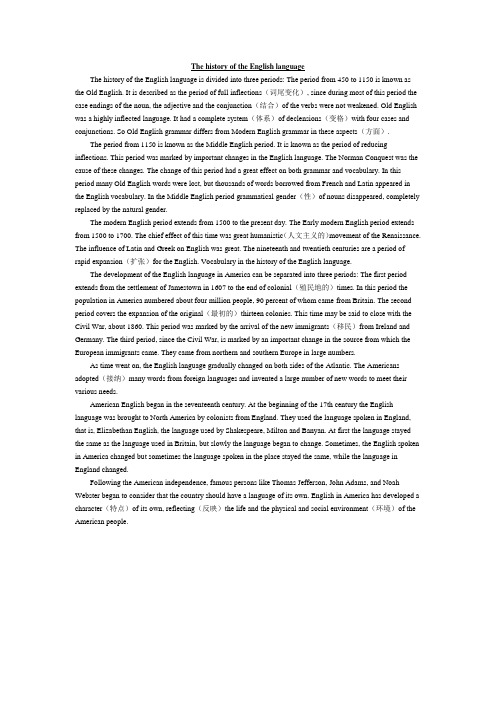
The history of the English languageThe history of the English language is divided into three periods: The period from 450 to 1150 is known as the Old English. It is described as the period of full inflections(词尾变化), since during most of this period the case endings of the noun, the adjective and the conjunction(结合)of the verbs were not weakened. Old English was a highly inflected language. It had a complete system(体系)of declensions(变格)with four cases and conjunctions. So Old English grammar differs from Modern English grammar in these aspects(方面).The period from 1150 is known as the Middle English period. It is known as the period of reducing inflections. This period was marked by important changes in the English language. The Norman Conquest was the cause of these changes. The change of this period had a great effect on both grammar and vocabulary. In this period many Old English words were lost, but thousands of words borrowed from French and Latin appeared in the English vocabulary. In the Middle English period grammatical gender(性)of nouns disappeared, completely replaced by the natural gender.The modern English period extends from 1500 to the present day. The Early modern English period extends from 1500 to 1700. The chief effect of this time was great humanistic(人文主义的)movement of the Renaissance. The influence of Latin and Greek on English was great. The nineteenth and twentieth centuries are a period of rapid expansion(扩张)for the English. Vocabulary in the history of the English language.The development of the English language in America can be separated into three periods: The first period extends from the settlement of Jamestown in 1607 to the end of colonial(殖民地的)times. In this period the population in America numbered about four million people, 90 percent of whom came from Britain. The second period covers the expansion of the original(最初的)thirteen colonies. This time may be said to close with the Civil War, about 1860. This period was marked by the arrival of the new immigrants(移民)from Ireland and Germany. The third period, since the Civil War, is marked by an important change in the source from which the European immigrants came. They came from northern and southern Europe in large numbers.As time went on, the English language gradually changed on both sides of the Atlantic. The Americans adopted(接纳)many words from foreign languages and invented a large number of new words to meet their various needs.American English began in the seventeenth century. At the beginning of the 17th century the English language was brought to North America by colonists from England. They used the language spoken in England, that is, Elizabethan English, the language used by Shakespeare, Milton and Banyan. At first the language stayed the same as the language used in Britain, but slowly the language began to change. Sometimes, the English spoken in America changed but sometimes the language spoken in the place stayed the same, while the language in England changed.Following the American independence, famous persons like Thomas Jefferson, John Adams, and Noah Webster began to consider that the country should have a language of its own. English in America has developed a character(特点)of its own, reflecting(反映)the life and the physical and social environment(环境)of the American people.。
《Unit 5 Languages around the world》优质教学课件(统编人教版)

( )4.As is known to us,the West Lake is known for its beauty.
( )5.Which door leads to the yard? ( )6.It is well known that lung cancer is connected with smoking. [答案] 1-6 FBCEDA
Unit 5 Languages around the world
英语是一种使用很广泛的语言,英语的历史真正起源于公元 5 世纪。
The history of the English language really started when other people arrived in England during the 5th century.
第三步 研读——能力升华接轨高考 根据 P62 课文内容,在空白处填入 1 个适当的单词或括号内单词 的正确形式。 The main reason 1._w_h_yChina's ancient civilization has continued all the way through into modern times has been the Chinese writing system.At the beginning,written Chinese was a picture-based language, which 2._d_a_t_e_s (date)back several thousand years to longgu.
2.Paragraphs 1-4 3.Paragraph 5
4.Paragraph 6 [答案] 2-4 CAB
A.China's present is connected with its past by written Chinese. B.Many foreigners learn Chinese culture and history through the Chinese written system. C.How did the Chinese writing system develop.
四月五日英语
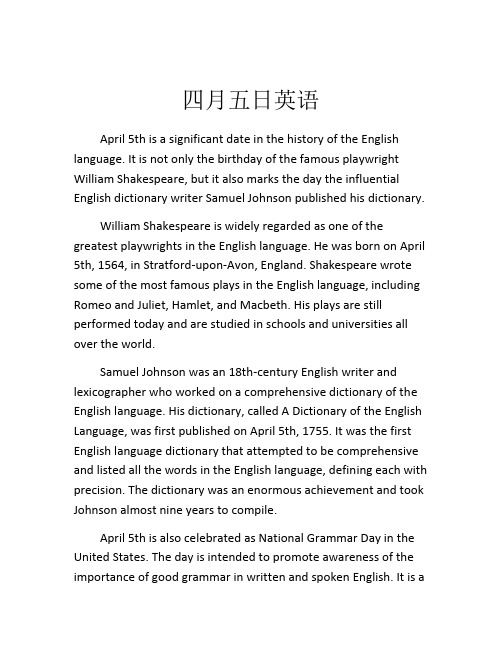
四月五日英语April 5th is a significant date in the history of the English language. It is not only the birthday of the famous playwright William Shakespeare, but it also marks the day the influential English dictionary writer Samuel Johnson published his dictionary.William Shakespeare is widely regarded as one of the greatest playwrights in the English language. He was born on April 5th, 1564, in Stratford-upon-Avon, England. Shakespeare wrote some of the most famous plays in the English language, including Romeo and Juliet, Hamlet, and Macbeth. His plays are still performed today and are studied in schools and universities all over the world.Samuel Johnson was an 18th-century English writer and lexicographer who worked on a comprehensive dictionary of the English language. His dictionary, called A Dictionary of the English Language, was first published on April 5th, 1755. It was the first English language dictionary that attempted to be comprehensive and listed all the words in the English language, defining each with precision. The dictionary was an enormous achievement and took Johnson almost nine years to compile.April 5th is also celebrated as National Grammar Day in the United States. The day is intended to promote awareness of the importance of good grammar in written and spoken English. It is aday to celebrate the English language and to promote the use of correct grammar in everyday communication.In addition to its significance in the English language, April5th is also observed as Arbor Day in many parts of the world. Arbor Day is a day to celebrate and appreciate trees, and to promote their planting and conservation.Overall, April 5th is a notable date in the history of the English language, and is celebrated in various ways around the world. Whether it is recognizing the achievements of Shakespeare and Johnson, promoting the importance of good grammar, or appreciating the beauty and value of trees, April 5th is a day to celebrate and reflect on the richness and diversity of the English language and our natural environment.。
剑桥雅思15听力原题
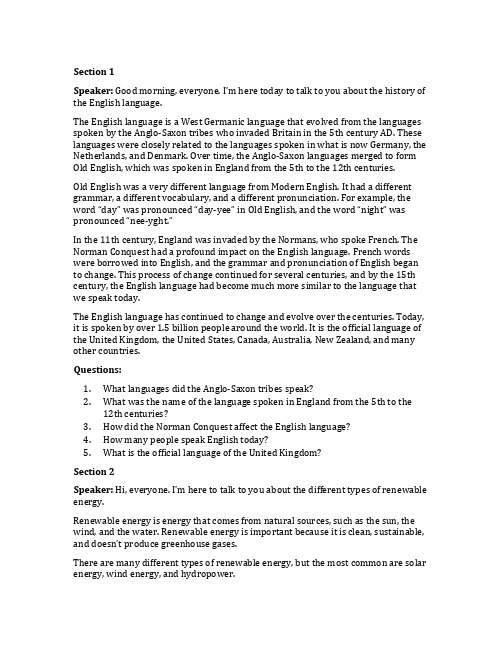
Section 1Speaker:Good morning, everyone. I’m here today to talk to you about the history of the English language.The English language is a West Germanic language that evolved from the languages spoken by the Anglo-Saxon tribes who invaded Britain in the 5th century AD. These languages were closely related to the languages spoken in what is now Germany, the Netherlands, and Denmark. Over time, the Anglo-Saxon languages merged to form Old English, which was spoken in England from the 5th to the 12th centuries.Old English was a very different language from Modern English. It had a different grammar, a different vocabulary, and a different pronunciation. For example, the word “day” was pronounced “day-yee” in Old English, and the word “night” was pronounced “nee-yght.”In the 11th century, England was invaded by the Normans, who spoke French. The Norman Conquest had a profound impact on the English language. French words were borrowed into English, and the grammar and pronunciation of English began to change. This process of change continued for several centuries, and by the 15th century, the English language had become much more similar to the language that we speak today.The English language has continued to change and evolve over the centuries. Today, it is spoken by over 1.5 billion people around the world. It is the official language of the United Kingdom, the United States, Canada, Australia, New Zealand, and many other countries.Questions:1.What languages did the Anglo-Saxon tribes speak?2.What was the name of the language spoken in England from the 5th to the12th centuries?3.How did the Norman Conquest affect the English language?4.How many people speak English today?5.What is the official language of the United Kingdom?Section 2Speaker:Hi, everyone. I’m here to talk to you about the different types of renewable energy.Renewable energy is energy that comes from natural sources, such as the sun, the wind, and the water. Renewable energy is important because it is clean, sustainable, and doesn’t produce greenhouse gases.There are many different types of renewable energy, but the most common are solar energy, wind energy, and hydropower.Solar energy is the energy that comes from the sun. Solar energy can be used to generate electricity or heat water. Wind energy is the energy that comes from the wind. Wind turbines can be used to generate electricity. Hydropower is the energy that comes from flowing water. Hydroelectric dams can be used to generate electricity.Renewable energy is becoming increasingly popular around the world. This is because renewable energy is clean, sustainable, and doesn’t produce greenhouse gases.Questions:1.What is renewable energy?2.Why is renewable energy important?3.What are the most common types of renewable energy?4.How is solar energy used?5.How is wind energy used?Section 3Speaker:Good afternoon, everyone. I’m here to talk to you about the i mportance of recycling.Recycling is the process of converting waste materials into new materials and objects. Recycling is important because it helps to conserve natural resources, reduce pollution, and save energy.There are many different materials that can be recycled, including paper, plastic, glass, and metal. Recycling these materials helps to reduce the amount of waste that goes to landfills and incinerators.Recycling also helps to conserve natural resources. For example, recycling paper helps to save trees. Recycling plastic helps to conserve oil. And recycling metal helps to conserve minerals.Recycling also helps to save energy. For example, recycling aluminum cans saves 95% of the energy that would be required to produce new aluminum cans from raw materials.Recycling is a simple way to make a big difference to the environment. By recycling, we can help to conserve natural resources, reduce pollution, and save energy. Questions:1.What is recycling?2.Why is recycling important?3.What materials can be recycled?4.How does recycling help to conserve natural resources?5.How does recycling help to save energy?Section 4Speaker:Hello, everyone. I’m here to talk to you about the different types of museums.There are many different types of museums, each with its own unique collection of artifacts and exhibits. Some of the most popular types of museums include art museums, history museums, science museums, and natural history museums.Art museums display works of art, such as paintings, sculptures, and drawings. History museums tell the story of human history, from the earliest civilizations to the present day. Science museums explain the natural world, from the smallest atoms to the largest galaxies. And natural history museums display specimens of plants, animals, and minerals.Museums are important because they help us to learn about the world around us. They can also be a great source of entertainment and inspiration.Questions:1.What are some of the most popular types of museums?2.What do art museums display?3.What do history museums tell the story of?4.What do science museums explain?5.What do natural history museums display?。
英语的历史的英语作文

英语的历史的英语作文The History of English。
English, as we know it today, is a language that has evolved over centuries, shaped by the influences of different cultures, people, and historical events. Its history is a rich tapestry that reflects the dynamic nature of human communication and the impact of globalization. In this essay, we will explore the fascinating history of the English language, from its origins to its current status as a global lingua franca.The origins of English can be traced back to the 5th century, when Germanic tribes from present-day Denmark, Germany, and the Netherlands invaded Britain. These tribes, known as the Angles, Saxons, and Jutes, brought with them their language, which would eventually evolve into Old English. Old English was a highly inflected language, with complex grammar and a rich vocabulary that was heavily influenced by the Germanic languages of the time.In the 11th century, the Norman Conquest brought French-speaking Normans to England, and their language, Old Norman, began to influence the development of English. This period saw the emergence of Middle English, a language that was characterized by the blending of Old English and Old Norman vocabulary and grammar. Middle English was the language of Chaucer's Canterbury Tales and Sir Gawain and the Green Knight, and it continued to evolve as a result of the cultural and linguistic interactions between the English and the Normans.The invention of the printing press in the 15th century played a crucial role in the standardization of English. The printing press allowed for the mass production of books and the dissemination of knowledge, which led to the establishment of a standardized form of English. This form of English, known as Early Modern English, was the language of Shakespeare's plays and the King James Bible, and itlaid the foundation for the development of Modern English.The expansion of the British Empire in the 17th and18th centuries further contributed to the global spread of English. English became the dominant language of trade, diplomacy, and education, and it was brought to different parts of the world by British colonists, traders, and missionaries. As a result, English began to absorb words and expressions from other languages, such as Spanish, Arabic, and Hindi, and it became a truly global language with a diverse vocabulary and a wide range of dialects.In the 20th century, the United States emerged as a major global power, and American English began to exert its influence on the world. American English, with its own distinct vocabulary, pronunciation, and idiomatic expressions, became a dominant force in popular culture, technology, and business. Today, English is spoken by over 1.5 billion people worldwide, and it is the official language of over 50 countries.In conclusion, the history of English is a story of resilience, adaptability, and transformation. From its humble origins as a Germanic dialect spoken by a few tribes in Britain, English has evolved into a global language thattranscends borders and connects people from different cultures and backgrounds. Its history is a testament to the power of language to shape the course of human history and to bridge the gaps between individuals and societies. As we look to the future, it is clear that English will continue to evolve and thrive, reflecting the ever-changing nature of our world.。
2023年公共英语四级考试阅读模拟试题5

2023年公共英语四级考试阅读模拟试题52023年公共英语四级考试阅读模拟试题5When one looks back upon the fifteen hundred years that are the life span of the English language, he should be able to notice a number of significant truths. The history of our language has always been a history of constant change—at times a slow, almost imperceptible change, at other times a violent collision between two languages. Our language has always been a living growing organism, it has never been static. Another significant truth that emerges from such a study is that language at all times has been the possession not of one class or group but of many. 『At one extreme it has been the property of the mon, ignorant folk, who have used it in the daily business of their living, much as they have used their animals or the kitchen pots and pans.』① At the other extreme it has been the treasure of those who have respected it as an instrument and a sign ofcivilization, and who have struggled by writing it down to give it some permanence, order, dignity, andif possible, a little beauty.A. attempt to continue the standardization of the languageB. evaluate language practices in terms of current speech rather than standards or proper patternsC. be more concerned about the improvement of the language than its analysis or historyD. be more aware of the rules of the languageusage2.Choose the appropriate meaning for the word “inflection” used in line 4 of paragraph 2.A. Changes in the forms of words.B. Changes in sentence structures.C. Changes in spelling rules.D. Words that have similar meanings.3.Which of the following statements is not mentioned in the passage?A. It is generally believed that the year 1500 can be set as the beginning of the modern English language.B. Some other languages had great influence on the English language at some stages of its development.C. The English language has been and still in a state of relatively constant change.D. Many classes or groups have contributed to the development of the English language.4. The author of these paragraphs is probablya(an) .A. historianB. philosopherC. anthropologistD. linguist5.Which of the following can be best used as the title of the passage?A. The history of the English language.B. Our changing attitude towards the English language.C. Our changing language.D. Some characteristics of modern English.-Vocabulary1.span n.跨度,范围,一段时间,期间2.imperceptible adj.感觉不到的,觉察不到的,极细微的anism n.生物体,有机体4.possession n.拥有,占有,领土,领地5.ignorant adj.无知的6.folk n.人们,民族7.permanence n.永久,持久8.Anglo-Saxons n.盎格鲁—撒克逊语,盎格鲁—撒克逊人,地道的英国人9.reversal n.颠倒,反向,逆转10.inflection n. 词尾变化11.preposition n. 前置词,介词12.conjunction n. 结合,关联,连接词13.in terms of 根据,按照,用……的话,在……方面长难句解析①【解析】“who”引导非限制性定语从句,修饰“the mon, ignorant folk”。
- 1、下载文档前请自行甄别文档内容的完整性,平台不提供额外的编辑、内容补充、找答案等附加服务。
- 2、"仅部分预览"的文档,不可在线预览部分如存在完整性等问题,可反馈申请退款(可完整预览的文档不适用该条件!)。
- 3、如文档侵犯您的权益,请联系客服反馈,我们会尽快为您处理(人工客服工作时间:9:00-18:30)。
同一时期英国殖民扩张
The
early 18th century British empire sailing techniques and maritime career in Europe leading position, the British colonialism has achieved far more than the expansion of competition in Spain, Portugal, France, the Netherlands and other countries the absolute advantage. British empire's colonial throughout the world, the British rulers forcing colonies to use English, English is widely circulated.
To
40 s in the early 20th century, English as an international communication tool, through the baptism of the two world wars, the unique language of space and power fan, not only the French, chief communication to become an international language, and replace the status of the German international common language of science and technology.
For example antenna, aerial(前者为“美式英语”,后者为“英式英 语” )-- 泛指无线电上使用的“天线”,但 antenna 远比 aerial(或aerial wire)流行。 departmentstors , stores-- 百货公司。美国人口中的 store,相当于英国人的shop.
orign of language
the bow-bow theory the divine theory the pooh-pooh theory
摹声说 神创说 感叹说
Hale Waihona Puke the yo-he-ho
theory
劳动叫声说
the evolutionary theory 进化说
莎士比亚时期
English
poet and dramatist Shakespeare (15641616), William Shakespear, inherit and carry forward the Renaissance of literature and art achievements, and put it to the peak. His plain language literature pursuit and skills, the language class people and popular literature, drama language
百货公司一般规模较普通商店大,分为若干部门,因此称
为department store是很贴切的。这个用词在英国也逐渐 流行,代替了英国沿用的stores。
Thank you
For example 古英语中的Thee 和 Thou 都是 You 的意思, 古代:thou, thee, thy, thine, thyself
现代:you, you, your, yours, yourself thou hast = you have
thou dost = you do
现代时期
拜伦,雪莱时期
In the 19th century English, known as the "Victorian English language". Byron and Shelley's flashing the glory of the historical linguistics achievement. Their contributions to the English language enhancement and creation, the social function of language and culture education function. The function of the language of the impact of social, in turn, promote the development of its own and language education. In this period, the classical language evolve slowly, a lot of used to belong to specification language vocabulary become vulgar language and elimination.
最初时期
English linguistics research can be traced back to the early 17th century. The European Renaissance in the 14th century to the 16th century. This great movement in the process of the history of Europe, with humanism as the core, from Italy, quickly spread to the whole of Europe. Of course, compared with modern linguistics, linguists can only call it "the traditional linguistics".
The history of the English language
王曾怡
英语语言学定义
Linguistics
is generally defined as the science of language or,alternatively,as the scientificstudy of language ,linguisticis a rich and exciting field
